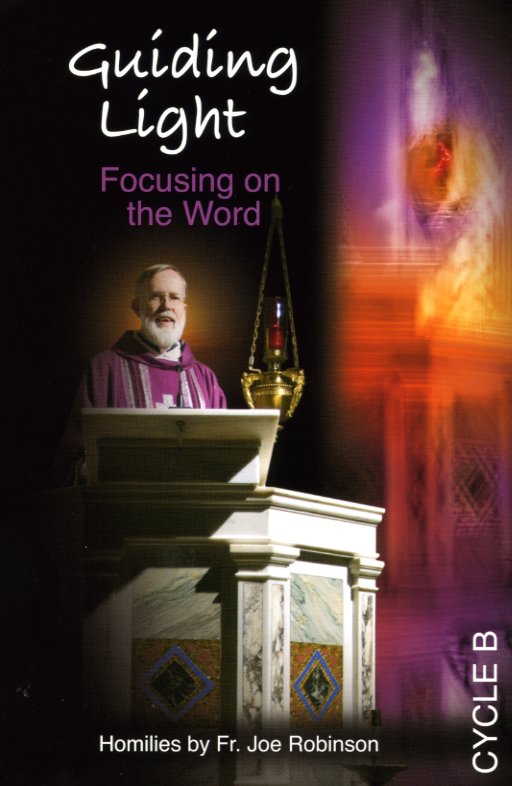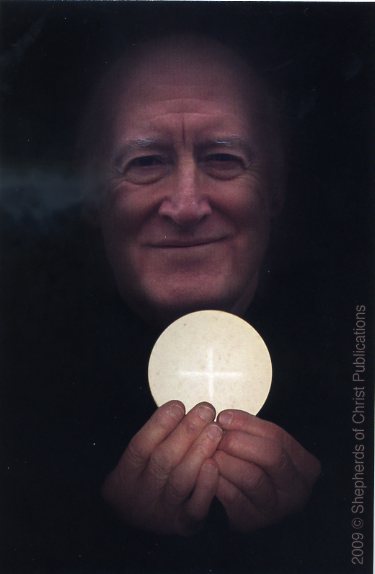Daily Writing

| Shepherds of Christ Daily Writing |
 |
September 1, 2010
September 2nd Holy Spirit Novena
Scripture selection is Day 5 Period II.The Novena Rosary Mysteries
for September 2nd are Glorious.
Please help us publish Cycle A -
Fr. Joe's Homily Book
1-888-211-3041

Get a canvas print of Mary's image
with a sliver of glass and
a little bottle of
Jesus and Mary water.
The glass will be fixed behind the
back of the picture.
Cost — $200.00
Call Sheila
1-513-470-3387

Also available
a cup with a Mary's image on it
Cost — $15
Call Sheila
1-513-470-3387
September 1, 2010
Exerpt From Response to God's Love
5
The Christian Virtues
The spiritual life, which is centered in the pattern of death-resurrection, variously expresses itself through the Christian virtues. Although we will not offer a treatment of all the Christian virtues, nor by any means an exhaustive presentation of any of them, we will present some considerations concerning a number of them, including, of course, the three main virtues—faith, hope, and love. Faith and love are the most important of the Christian virtues because they assimilate us most intimately to God's life. God's life is a life of divine knowing and loving, and through Christian faith and love we participate in these Trinitarian operations. Hope, for its part, gives a very special support to faith and love.
Faith
There are special problems and obstacles that the modern Christian must encounter in his or her life of faith, one of which is the fact that modern Christians do not live in an atmosphere that is conducive to faith. Long ago, in the golden age of Christendom, such a favorable condition existed, for practically everybody with whom one lived and worked was a believer. Today, however, we find ourselves at the opposite end of the gamut; we experience various forms of disbelief not only in the world at large but in some cases within our own families or among those with whom we have shared the mystery of faith within the Christian community. Rahner describes the situation this way: "The external situation of Christian belief, of the possibility and duty of faith, is characterized by the crucial fact that Christianity and the Church are, in the expression of Peter Reyer, a cognitive minority. What was the situation like in the past? For at least 1500 years the Church, and its theology and apologetic, existed in a historical and intellectual world formed by a more or less homogeneous Christian society. Faith constituted public opinion: it was accepted and taken for granted as self-evident. God's existence, for example, was regarded by St. Thomas Aquinas as an assumption requiring no discussion for the ordinary mortal, for belief in God was an assumed fact in society to which everybody referred without question and with perfect right. Today the situation is quite different. Christianity and the Church are no longer publicly supported without question by society, or at least such backing is rapidly crumbling away" (Theological Investigations, vol. 16, p. 5).
Another faith problem facing the contemporary Christian is the doctrinal situation within the Church. Concomitant with the deep-rooted change in today's Church, there has arisen a certain theological and doctrinal confusion. All things considered, this has perhaps been inevitable because the Church's teaching is, to a certain extent, being recast in language that is more relevant and meaningful for contemporary men and women. In addition, speculations among professional theologians, when they are reflected through the prism of the mass media, sometimes become distorted and cause considerable confusion among the faithful. And, to be perfectly honest, we should admit that, along with much good theology, there has been some bad and unsound theology making the rounds in the post-Vatican II Church. All of these factors have contributed to a confused situation that does not make the life of faith any easier. We should remember, however, that whatever problems might confront the person of faith in this age or in any age, we do know that God's grace compensates for these difficulties. If today's faith is especially being put to the test, God is also granting special graces to preserve us in our belief.
What does faith accomplish in us? The contemporary theology of faith emphasizes that faith established a personal relationship between the Christian and God. Faith is concerned primarily with a response to the personal God and only secondarily, but definitely very importantly, with the truths that God reveals. This should not surprise us, for there is a similarity regarding our relationships with human persons. A person who is of low character and known to be a liar, for example, does not elicit our trust; we tend to disbelieve whatever he or she might say. On the other hand, we tend to believe whatever a person of good character tells us. Human faith, then, directs us, first, to the person and, secondarily, to what he or she says. Divine faith works similarly; it directs us primarily to God himself, and secondarily to the truths he gives us. Moreover, faith not only establishes a special, personal relationship between the believer and God; because of the new vision of mankind that faith gives, it calls the believer to a faith-inspired relationship with his or her neighbor. Faith is truly person orientated—it directs the Christian to God and others and forms personal relationships accordingly.
Faith is meant to involve not only the intellect, but the entire person; this is the biblical concept of faith. True, the graced intellect assents to the truths that God reveals, but one's whole being is also meant to assent. Ideally, Christian faith is the commitment of the entire person to God in Christ. Mature faith is the complete dedication of oneself and all of one's powers and capacities to Jesus and his cause.
Because faith is the commitment of one's entire being to the truth of Jesus, we must live the truth of Jesus, not merely intellectually assent to it. We properly comprehend religious truth only when we live it, savor it, experience it to the depths of our being. How much more we have understood the truth of Christ and its power, wisdom and beauty when we were not only assenting to this truth with our intellects but also living it, allowing it to permeate and transform our entire existence. As a corollary, we see the danger of intellectually assenting to Christ's truth without attempting to live accordingly. One's faith can grow weak and even die if there is a constant and serious dichotomy between what we believe and the manner in which we live.
If we ourselves grow in faith by living its truth, we also progress by witnessing the truth of Jesus in the lives of others. This is an application of the principle of continued Incarnation. In the historical Incarnation, Jesus taught us the truth of the Father not only verbally, but also by his own living of that truth. God hands on the truth of Jesus not only through various verbal forms, such as the teaching of the Church, but also, in part, through the manner in which Christians live this truth. Christianity has not exerted a greater influence in the world because, in part, too few Christian lives have properly assimilated and manifested the truth of Christ. Indeed, this truth tends to have its full attractive force only when it is observed to be properly lived out in the lives of Christians who profess this truth. Our faith is blessed when we ourselves encounter such Christians.
When we live according to faith, we are living according to a vision of God, humanity, and the rest of creation. Faith tells us things about God and creation that we could either not otherwise know or know only with greater difficulty and with less certainty. A good example of the former is the doctrine of the Trinity: Unaided reason can never arrive at this sublime truth; only the intellect that has been elevated with the grace of faith can encounter the Triune God.
If we are to properly progress in the spiritual life, we must allow this vision of faith to more and more penetrate our activities. Increasingly, we should become contemplative in action; we should view reality in a way that is similar to God's view of reality. Increasingly, everything we see should remind us of God because everything that is good and true and beautiful really does reflect God. The beauties of nature, for example, manifest his beauty; the raging storm at sea reflects his power; the stillness of the forest reminds us of God's holy silence; and the goodness, the kindness, and the love that we observe in others around us tell us that God is infinitely good and kind and loving.
The vision of faith allows us to see mankind and the world in a manner that differs from the nonbeliever's view. As contemplatives in action, we should act upon this vision. Every man, woman, and child is marked with the blood of Christ. If Jesus loved them so much—indeed, if he now loves them so much—can we be indifferent to their needs, both spiritual and material? Can we be indifferent to all the problems that burden modern men and women? If we are Christians of living faith, we know that we cannot be indifferent. The vision of faith should inspire us to action according to our vocation, talents, opportunity, time, and energy. We should be laboring to make mankind and the world more reflective of Christ's image. To the extent that we do not, we are betraying the vision of faith.
Hope
Christian hope is a virtue that allows us to tend toward God in Christ as our absolute fulfillment, our absolute future. Hope allows us to trust that God will grant us the graces necessary to achieve this goal.
The necessity of hope in our lives is obvious. Without a sustained desire for God as our absolute future, we would not be able to live as we should. If God is not our goal, then our lives will be miserably shaped by something infinitely less, whether it be money, sex, social status, or anything else that can grip the human heart as an unauthentic end rather than a legitimate means to God.
The necessity of hope is also realized as we examine the nature of the supernatural life. Without God's grace we cannot initially attain this life, we cannot maintain ourselves in it, and we cannot grow in it. At times God allows us to strikingly and intensely experience how helpless we are without him. Such episodes in the spiritual journey can be very painful, but they can also be opportunities for great growth, for we are meant to emerge from these experiences with an increase of trust in God; we realize, in short, how weak we are in ourselves, but how strong we are if we rely on him.
Let us also remember that as we trust in God so shall we receive. There are certainly exceptions to this role—God can, for example, give great graces to a person at a time when trust is feeble—but the general principle stands. In our Christian hope, let us expect great things from God—remembering what truly great things are in the sight of God—not only for ourselves, but also for others. That we should direct our hope toward the needs of others as well as our own leads us to another dimension of hope, namely, the fact that it possesses, as do all the virtues, an ecclesial and cosmic dimension.
Hope is ecclesial. We are members of the Body of Christ, the People of God, and we go to the Father in Christ and by the Spirit not as isolated individuals but as members of a community. Consequently, our hope should be concerned with the total progress of the Church. The Church is meant to assimilate Christ more and more, for she is a pilgrim Church; she will not arrive at her final maturation in Christ until the end of time. Meanwhile, our Christian hope should inspire us to realize that we can and should labor a diminution of the Church's imperfections and sinfulness, and a greater participation in the Church's realized eschatology, that is, a greater sharing, here and now, in that life which will be fully possessed only in eternity.
Christian hope, which is both personal and ecclesial, is also cosmic. We hope not only that we ourselves as well as the entire Christian community will be assimilated to Christ more intimately now, but also that we will finally possess him perfectly in eternity. What is more, we also hope that all mankind as well as the whole of creation will evolve closer to the Omega Point—Christ himself. St. Paul reminds us of this cosmic dimension of Christian hope: "Creation was made subject to futility, not of its own accord but by him who once subjected it; yet not without hope, because the world itself will be freed from its slavery to corruption and share in the glorious freedom of the children of God. Yes, we know that all creation groans and is in agony even until now. Not only that, but we ourselves, although we have the Spirit as first fruits, groan inwardly while we await the redemption of our bodies. In hope we were saved. But hope is not hope if its object is seen; how is it possible for one to hope for what he sees? And hoping for what we cannot see means awaiting it with patient endurance" (Rom 8:20-25).
Love
Love is the Christian virtue. Jesus himself has summarized Christianity in terms of love; all the other virtues variously serve love's purpose. We want to be somebody—persons of real significance. Perhaps we think such a desire is egotistic and unbecoming for Christians; however, this is simply not true if our desires for greatness are actually authentic.
Jesus, in his own manner of life, has vividly pointed out to all of us where true greatness lies. He tells us to seek greatness, but not to be deceived about what greatness truly is. Christ dealt with the powerful and the wealthy, but he was not awed by them. As God, he is, of course, infinitely greater than they; even as man, however, Christ realized that he far surpassed them, for he knew that the Father had made his humanity perfect with the fullness of grace. But Jesus chose not to surround his greatness with any trappings. He was born into this world in poverty and simplicity and was looked down upon as a Nazarene of no social status, yet he stands out as a giant of greatness.
It is possible for a person to possess true greatness along with riches and social status—although this is no easy task—but no one is great because of these. A person is great because of the manner in which his or her true internal greatness allows him or her to properly use both riches and social status. Christ tells us this—namely, that a person is great not because of what he or she possesses, not because of social status, nor because he or she is admired by the crowds, nor even primarily because of great works he or she might accomplish, but simply because of what he or she is. Great works, if they are authentically great, are possible because of the innate greatness of the person who achieves them. They are incarnation, in other words, or an externalization of the primary greatness that is the person himself or herself.
Christ's greatness as man, then, was the innate greatness of his humanity. His greatness was the fullness and perfection of a truly human life—a life that was elevated above its mere naturalness to the life of grace. Christ as man possessed this life of grace in its fullness as a result of his human nature's close union with the divine person, the Word. Christ's greatness was not an isolated greatness; rather, it was a greatness that existed in relationships of love.
Jesus' life was a life of love. He mightily loved his Father and his fellow humans. The poverty, the hiddenness, the disappointments, the accomplishments, the weariness, the joy and the happiness, the pain and the agony—all that constituted the earthly life of Christ was experienced and lived out within the framework of love. Jesus was the great man that he was because he was a great lover. He loved in everything he did—tenderly, manfully, with understanding and sympathy. He loved with complete devotedness and a deep, sincere concern for the individual. He loved with a passion for that which was true and beautiful and good. He loved with a complete conformity to his Father's will. He loved always and completely. He loved with a gift of himself, always pouring himself out, even to the point of death. He gave himself in love to the Father and to us until there was no more to give. This was the poignant beauty of Christ's life. That was his greatness, a greatness that was centered in love. He was a giant of greatness because of what he was—a tremendous lover.
We can be tempted to reject this marvelous example of Christ. We can seek our greatness and fulfillment in a manner that necessarily results in disappointment; we can strive after greatness in ways that God does not intend. These wayward wanderings, however, result in a feeling of dissatisfaction and frustration. If we follow these false leads, we will eventually come to realize that they have betrayed us. Indeed, these wayward wanderings possess the potential for nothing but betrayal, because they are not rooted in Christ and his way of life—the way to true personal greatness.
We must incessantly remind ourselves of the example that Jesus has given us. We must deepen our realization that our fundamental greatness consists primarily in what we are, and we are to the extent we love both God and others. St. Paul, in his own inimitable way, tells us of this: "If I speak with human tongues and angelic as well, but do not have love, I am a noisy gong, a clanging cymbal. If I have the gift of prophecy and, with full knowledge, comprehend all mysteries, if I have faith great enough to move mountains, but have not love, I am nothing. If I give everything I have to feed the poor and hand over my body to be burned, but have not love, I gain nothing" (1 Cor 13:1-3). Our greatness, then, lies in our relating in love to both God and our fellow humans—yes, even those whom we will never know or see directly, but whom our love can nevertheless reach out and touch because of our union with Christ. With Christ, there are no space barriers, and, therefore, uniting our love to his can unite us to people the world over.
We grow as Christians both through a life that is centered in love and within the milieu of the human condition. This is the only framework we have for achieving our greatness or true personality, and consequently, we must not shirk the human condition. Jesus did not shirk it, but rather accepted it and manifested his greatness within it, despite the pain and even agony that the human condition at times heaped upon him. It is true that Jesus could rejoice during the course of his life because of the goodness, sincerity, and response of some of those with whom he dealt. The love that Mary and Joseph showered on Jesus, for instance, no doubt gave him great joy. During his life, however, Jesus often suffered because of the evil side of men and women—their pettiness, cowardice, insensitivity, selfishness, egotism. In other words, Jesus suffered at the hands of others because they were not what they should have been. Nonetheless, these experiences did not thwart the greatness of Jesus; he was always what he should have been despite the limitations of the human condition that surrounded him. Jesus was always the tremendous lover, and he loved even at those times when it was very painful to do so.
Our own greatness in Christ, our own growth as Christians, can develop smoothly and joyfully because, from time to time, we experience the goodness and love within the hearts of others, and this makes it easy for us to love as we should. Sometimes, however, the less wholesome side of both humanity and the human condition crowds in upon us, and we find it rather difficult to go on loving as we should. In the same way that Christ suffered because of others, we, too, as we try to love, suffer because of others. We suffer because others do not always understand us—this can be true even of those who dearly love us. We suffer because some do not appreciate what we do for them—and sometimes what we do exacts great personal cost. We suffer because others either reject us or make us the objects of their meanness and selfishness. We suffer because there are some who ignore us. At times we suffer so much that we are tempted to quit loving as we know we should. We are tempted to withdraw from the pain of giving ourselves in love into an egotistic enclosure of self-seeking, where, we think, we will no longer suffer at the hands of others—or at least we will not suffer so much. To surrender to such a temptation, however, is to forget what Christian greatness really is—namely, a life of love for God and man, a love that does not shrink from the pain that results from loving in an imperfect world, a love that is meant to become greater and more selfless regardless of the way others might treat us. Love, then, accepts both the joy and the pain of life and carries on under both conditions.
Another characteristic of this highest Christian virtue is its concentration upon the present—love is now. Love is more concerned with the present than it is with the past or the future. Although love does not fail to give proper attention to either the past or the future, its main emphasis is upon the present.
We are past-persons, present-persons, and future-persons; however, we are mostly present-persons. The past, after all, is forever gone—we cannot bring it back and relive it. We can learn from past mistakes and otherwise profit through a proper reflection on the past; however, we must not allow our legitimate recollections of the part of life that has passed us by to deteriorate into morbid preoccupations concerning what has been, but now is no more. We must think of the future and properly plan so that we will enter the days ahead reasonably prepared for various eventualities. Thinking about future goals can also spur our present enthusiasm and endeavors; however, to live too much in the future is a detriment to present achievement. Excessive thought about the future dilutes the energy we should be expending on the present.
Love is now. The more love matures, the more it concentrates upon the present. Love welcomes each day with a fresh joy and a renewed gratitude to God for the opportunity to once again be and become for him and for others. Love realizes that it does not fully possess the past or the future—it can only fully grasp the present, and it loathes to waste any of the preciousness that "the now" offers.
Love is gentle, love is tender. Love is sensitive to the gentleness in nature; it is moved by the softness of the freshly fallen white snow, the coolness of an autumn breeze tenderly stroking the brow, and the softness of the grass in May-time greenness. Much more important, love is sensitive to the needs for gentleness, for tenderness, in human affairs. Consequently, love gently comforts the grief-stricken parents of a child so tragically and suddenly snatched away in death; love gently encourages those to whom life seems hopeless; love sensitively tends to the needs of those who are so often and so easily forgotten; love rejoices in the tender embrace of a black boy and a white boy in their prejudice-free playfulness. Yes, the gentleness of love manifests itself in these and in many other ways, and, in so doing, imitates the gentleness, the tenderness, of Jesus himself. "O Jerusalem, Jerusalem, murderess of prophets and stoner of those who were sent to you! How often have I yearned to gather your children, as a mother bird gathers her young under her wings, but you refused me" (Mt 23:37).
The fact that love is gentle does not mean that it is not strong. It is precisely this, and the blend between its tenderness and its strength constitutes a facet of its attractiveness. Love is strong in many ways: It is not discouraged by the evil in the world that threatens to thwart the accomplishment of love's goals; it realizes that the strength of goodness is mightier that the force of evil, and that, ultimately, love wins out. Love is also strong in bearing with the temporary failures that are experienced in the pursuit of its purpose. Although love may be disappointed, it nevertheless realizes that the only failure it cannot conquer would be love's refusal—love's failure—to go on loving, and true love will never quit. Love is strong in its willingness to take the necessary means to achieve its goals, even though this might entail great personal cost, or cause misunderstanding or even hurt among those who are the recipients of this love.
Love is not jealous. It is, of course, tempted to jealousy, but true love refuses to yield. Love is not jealous of another person's affections, nor is it jealous of another person's talents. Love always realizes the important distinction between one's jealous feelings, which cannot always be willed away, and one's will, which can refuse to consent to the evil suggestions of jealous feelings.
Love is secure. A person who properly loves is in touch with his or her true self and realizes that he or she is tremendously loved by God. The person who properly loves feels secure in his or her exercise of love toward others. He or she feels secure enough to extend love towards others in various ways, even in those relationships in which little or no love is returned. In doing so, however, this person loves prudently and appropriately. That is to say, he or she does not try to force the love of friendship upon a person who does not seem to want this type of love, but rather, will love that person with a different, more appropriate love.
Closely allied to love's feeling secure is love's intuition in realizing the evils of possessiveness. Feeling reasonably secure of his or her self, the authentic lover does not try to possess the persons whom he or she loves, but leaves the other free. In fact, authentic love for the other makes the other more free and helps the other to grow in all ways—including growth along the paths of real freedom. The authentic lover leaves the other free to grow in all sorts of ways, to relate to other people, and to undertake new things—activities that might well make the loved one much less accessible.
Love is contemplative. It realizes it must sustain and develop a contemplative awareness of reality if it is to love properly. To relate in love to reality as we should means that, first, we must view reality according to its true nature; that is, we must see things according to our faith vision. Jesus has left us with this proper view of God, man, and the rest of creation. Jesus has told us both how to relate to God and his creation, and how to love. This faith vision must be consistently actualized through a contemplative or prayerful awareness of the people, events, and circumstances that are a part of our daily lives. If we fail, for example, to see people as they really are in their core existence—namely, created and redeemed by God's love—and, instead, allow ourselves to be absorbed by more superficial aspects of their persons, then we will not love them as we should.
Love seeks, therefore, a certain degree of solitude in order to nourish this contemplative attitude. A person cannot hope to exercise a contemplative awareness throughout the myriad and often complex happenings of daily existence unless there are periods of withdrawal during which he or she can drink more deeply of the wisdom that contemplation offers. A person must conquer the temptation that deceitfully suggests that the seeking of solitude is a selfish desire to flee the pain of human encounter. Authentic solitude is never selfish; rather, authentic solitude is a renewed opportunity for refurbishing both one's contemplative vision and one's determination to love more maturely according to this perspective.
Love knows what love really is, and this awareness is a result of love's contemplative thrust. One of the truths that emanates from the act of contemplation is the realization of what actually constitutes true love. This is no small accomplishment, for, despite the numberless volumes that have been written about love, one can still have only a blurred idea of what it really is. Love is the gift of self to promote the authentic good of the one or ones who are loved. The manner in which the gift of self is made is commensurate with the type of relationship. A doctor gives himself or herself to his or her spouse in one way, to his or her children in another, to his or her patients in yet another way, and to his or her friends in a way that is still further differentiated. Whatever way the gift of self is made, however, it has the same basic goal in mind—namely, to promote the real good of the other. Love realizes that it is not always easy to discern what really promotes the true good of the other; however, despite this difficulty, love is aware of its true identity—love, in short, knows what love really is.
Love is reconciliatory and integrative. Love hates divisiveness. It knows the difference between diversity and divisiveness. It knows that healthy diversity reflects the varied richness of human existence and is something to be desired. It knows, too, that divisiveness is the sworn enemy of community; divisiveness perniciously eats away at those bonds of love and union that are meant to unite the members of God's human family. Love, consequently, works to promote the integrative process that harmonizes human persons and human events according to God's holistic plan, a plan in which the numerous and richly diversified parts become increasingly beautiful the more they contribute to the health and functioning of the whole.
Love is trusting. Regarding a person's relationship with God, this attitude of trust grows in proportion to the atmosphere of love; as one grows in the realization of how much God loves him or her, and responds with a love of his or her own, trust in God matures and is a dominant facet of one's daily existence. A serenity of spirit becomes more obvious as the person grows in the awareness of both how much God cares and how supportive his loving embrace is, come what may.
This attitude of trust also characterizes one's relationship with others. One who is properly loving is not naive or oblivious to the fact that one can be needlessly hurt by others, that one's trust in others can be betrayed. On the contrary; one who is properly loving realizes that there is certainly an evil side to mankind, but nevertheless prefers to concentrate on the basic goodness of the human heart. This positive focus allows a person to trust that people not only will frequently act according to this goodness but, as a matter of fact, will actually be encouraged to do so when they themselves are the recipients of a true and sincere love.
Love is also affirming. By the very fact that one loves another, the other is encouraged to be and to become according to his or her uniqueness. Being loved enhances a person's sense of worthwhileness. A person who is loved is encouraged to develop his or her uniqueness, to feel more at home with himself or herself, and to accomplish further the special mission in life that only he or she can fulfill.
Love is not afraid to love too much. Sometimes people who deeply love a child or a spouse or a friend wonder if it is wise to love another so much. The fragility of existence is manifest, and the newspapers alone daily remind us how suddenly and unexpectedly loved ones can be taken away. Or, if death is not the event that severely wounds the heart of the lover, other circumstances can inflict the pain that results from a deep love, not the least of which is the perception that the one who is loved so deeply does not return the love at all. There are various reasons, consequently, why a person can wonder if it is possible to love another too much.
Jesus himself gives us the answer to this question. He has told us to love and to grow in love; it is impossible, then, to love others too much. We must be careful, however, to distinguish true love from elements of nonauthentic love. Nonauthentic love can cause all sorts of problems; one difficulty is the desire to wrongfully possess the loved one, a desire that can lead one to feel that he or she has loved too much when the desire is frustrated. Another problem that results from nonauthentic love is the misconception that love has failed either when it is not reciprocated, or when it is not reciprocated to the degree that it itself has loved, and, therefore, should never have been extended in the first place. It is also important to realize that authentic love, even when it is growing, can change its form in relation to a particular person. What was once romantic love, for example, can change to a love of friendship, or to that general type of love for neighbor that we should have for everyone. Consequently, although it is possible to say that a person can love another too much with the love of friendship if this is the inappropriate form, it is not possible to say that a person can love another excessively according to the more general form of love of neighbor.
Love is patient. Love realizes that, for the most part, the growth of God's kingdom occurs at a very gradual pace. Sometimes this growth process seems almost to halt, and a person wonders if the efforts of love are actually producing any effects. Patience conquers this temptation, however, and enables love's work to continue. Patience, consequently, helps prevent the waste of talent in the work of the kingdom. It seems that certain talented people have never realized their potential in promoting Christ's cause precisely because they were not patient enough with others and themselves. Patience is a virtue that is not much discussed, but is nevertheless extremely necessary.
Love is not proud, is not egotistical. Love is interested, of course, in the self and the good of the self. The authentic lover, however, realizes that the love of one's true self is based on the awareness that one has been created and redeemed by God's love, that one has been endowed with various gifts by the creator, and that these gifts are to be exercised in the loving service of God and mankind. Love, then, does not become selfishly proud in its accomplishments; rather, love realizes both that God is the ultimate source of personal accomplishments, and that one can achieve only what God helps a person to accomplish. Love is very much aware of Jesus' words that, without him, we can do nothing.
Love is both universal and specific. Love is universal in that it excludes no one; for example, it includes all mankind in its prayers. Love is very much aware, however, that one can say he or she loves mankind, but be sadly lacking when it comes to manifesting love in various ways according to the concrete setting of everyday. True love, then, does not shy away from the painful aspects of loving specific individuals in definite, concrete circumstances. Admittedly, such a service of love can be difficult, demanding, and unattractive in certain ways. Personality flaws in others, or particular personalities that are not attractive to the one who is trying to be of help, or indifference, or even hostility on the part of those one strives to serve—these and other realities are a true test of a person's willingness to concretely implement his or her avowal that he or she indeed does love his neighbor as the Lord commands.
Love is what it is all about. Jesus himself has told us this. We are and we become Christians to the extent that we love. Love gives meaning to our lives; it is the motivating force that allows us to endure the boredom of prosaic everydayness, and it is also the motivating factor that enables us to undertake the magnanimous, namely, that which tries our creative and staying power to the utmost. Love allows us to dream dreams; it also gives us the courage to implement these dreams in concrete achievement despite the fear, the anxiety, the pain, and the weariness that we experience along the way. Love allows us to bear with the ugliness of evil in the world; it also allows us to see that, despite this ugliness, the truth, the beauty, and the goodness of God's creation is even more manifest. Love accomplishes all this and much more; it is for all seasons and for all circumstances. Love is now.
Give a gift that lasts.





$10.00 each plus shipping
Call 1-888-211-3041
Shepherds of Christ
We can send Fr. Joe's
homily book to a priest for 75¢.
Can you please help us get
these homilies to the priests?
Please help us with your donation.
Call Shepherds of Christ
1-888-211-3041
Prayer Cards available
Holy Spirit Prayer Act of Consecration to
Immaculate Heart of MaryAct of Consecration to
Sacred Heart of JesusPrayer for Priests
Prayer before the Holy Sacrifice of the Mass Prayer for Union with Jesus
Available for .25¢ each plus postage
Call Shepherds of Christ
1-888-211-3041
Prayer Card 4" x 6"
.50¢ each plus postage







size 5 1/2" x 8 1/2"
$1.00 plus postage

Statues
Sacred Heart of Jesus w/glass - 18
Our Lady-Guadalupe w/glass - 12
Limpias - 8
Immaculate Heart w/glass - 18
I Heart - Ivory w/glass - 18
Our Lady of Grace w/glass - 18
Our Lady-Mt. Carmel w/glass - 18
Our Lady of Lourdes w/glass - 18
Infant of Prague w/glass - 24
Sacred Heart of Jesus w/glass - 24
Sacred Heart -Blessing w/glass - 24
Sorrowful Mother w/glass - 24
I Heart - Ivory w/glass - 24
I Heart of Mary w/glass - 24
Our Lady of Lourdes w/glass - 24

Our Lady-Guadalupe w/glass - 28
Our Lady of Grace w/glass - 24
Our Lady-Mt. Carmel w/glass - 24
Fatima w/glass - 11
Pilgrim Virgin w/glass - 12
Pilgrim Virgin w/glass - 15
Fatima w/glass - 18
Pilgrim Virgin w/glass - 18
Pilgrim Virgin w/glass - 27
St. Padre Pio
St. Joseph
St. Therese
St. Francis
St. Anthony
St. Claire
Limpias
St. Jude

Divine Mercy
Holy Family
Angel
St. Philomena
Pieta - Marble
Pieta - Color
Holy Family

St. Anthony - 18
St. Francis - 18
St. Joseph - 18
St. Therese - 18
St. Rita - 18
St. Clare - 12

St. Rita - 12
St. Padre Pio - 12
ivine Mercy - 12
St. Michael - 11
Shepherds of Christ Ministries
P. O. Box 627
China, IN 47250
Toll free - 1-888-211-3041
Local - 1-812-273-8405
fax - 1-812-273-3182
web: www.sofc.org
e-mail: info@sofc.org
Size Price Quantity Holy Family
24"
$180
Limpias
24"
$125
St. Anthony
24"
$125
St. Claire
24"
$125
St. Francis
24"
$125
St. Joseph
24"
$125
St. Jude
24"
$125
St. Padre Pio
24"
$125
St. Therese
24"
$125
Divine Mercy 22"
$125 Angel 22"
$100 St. Philomena 20"
$100 St. Philomena 16"
$65 St. Joseph 18"
$65 St. Francis 18"
$65 St. Anthony 18"
$65 St. Rita 18"
$65 St. Therese 18"
$65 Pieta - Color 15" $75 Pieta - Marble 15" $75 Holy Family 12"
$60 St. Padre Pio - standing 12"
$40 St. Padre Pio - sitting 8"
$50 St. Michael 11"
$40 St. Rita 12"
$40 Divine Mercy
12"
$40 St. Claire 12"
$40 Limpias 8"
$25 Our Lady of Guadalupe w/glass 28"
$500 Our Lady of Mt. Carmel w/glass 24"
$500 Immaculate Heart of Mary w/glass
24"
$500 Immaculate Heart - Ivory w/glass
24"
$500 Infant of Prague w/glass
24"
$500 Our Lady of Grace w/glass
24"
$500 Our Lady of Lourdes w/glass
24"
$500 Sacred Heart of Jesus w/glass 24"
$500 Sacred Heart -Blessing w/glass 24"
$500 Sorrowful Mother w/glass
24"
$500 Immaculate Heart of Mary w/glass 18"
$300 Immaculate Heart - Ivory w/glass 18"
$300 Sacred Heart of Jesus w/glass 18"
$300 Our Lady of Lourdes w/glass 18"
$300 Our Lady of Grace w/glass 18"
$300 Our Lady of Mt. Carmel w/glass
18" $300 Our Lady of Guadalupe w/glass 12"
$200 Fatima w/glass
11"
$150 Fatima w/glass
18"
$250 Pilgrim Virgin w/glass 12"
$160 Pilgrim Virgin w/glass 15" $200 Pilgrim Virgin w/glass 18" $250 Pilgrim Virgin w/glass 27"
$450
Call for Shipping Price (1-888-211-3041)
Name
Sub-Total Address
IN Tax (7%) City
Shipping State Zip
Donation Telephone
Order Total
Shepherds of Christ
P. O. Box 627
China, IN 472501-888-211-3041
Fr. Joe's Homily Books
Guiding Light - Cycle A
The Word Alive in Our Hearts$10.00
Guiding Light - Cycle B
Focusing on the Word$10.00
Guiding Light - Cycle C
Feed My Soul$10.00
Fr. Carter's Books
|
Priestly Newsletter Book I
12 Newsletters $12.00 |
17 Newsletters $12.00 |
Priestly Newsletter Book 3
4 Newsletters & Prayers $12.00 |
|
|
Response to God's
Love |
Tell My People |
$10.00 |
|
|
Synopsis of the Spiritual Life
Spirituality Handbook
|
$10.00 |
$10.00 |
Fr. Pasquini's Books
|
Authenticity |
In Imitation of Two Hearts
For those
suffering or |
Light, Happiness and Peace
Journeying through traditional $10.00 |
|
Medicine of Immortality
Prayers and Meditations - will assist the reader in growth toward a deeper understanding of the mystery of the Eucharist $10.00 |

Ideal for RCIA, Adult & Youth Bible Study, Homeschooling,
Catholic $10.00 |
Shepherds of Christ Newsletters $36.00 |
DVDs and CDs by Fr. Pasquini
|
Authenticity DVD $10.00 |
Nursing Home Mass DVD $10.00 |
Consolation DVD $10.00 |
|
Medicine of Immortality 2 CDs - $17.00 |
In Imitation of Two Hearts DVD $10.00 |
Consolation CD $8.00 |
|
Nursing Home Mass CD $8.00 |
Holy Spirit Novena DVD
$10.00 |
Divine Mercy Chaplet DVD
$10.00 |
God’s Blue Books
God’s Blue Book 1 –
Teachings to Lift You Up$10.00
God’s Blue Book 4 –
The Love of the Hearts of
Jesus and Mary$5.00
God’s Blue Book 2 –
The Fire of His Love$10.00
God’s Blue Book 5 –
So Deep Is the Love of His Heart$5.00
God’s Blue Book 3 –
Love God, Love One Another
(Fr. Carter's favorite)
$10.00
God’s Blue Book 6 –
He Calls Us to Action$10.00
Rosary Books
The China Church is over 140 years old
and we pray in there 24 hours a day.
It needs stucco and so does
the community building.
Can you please help us?
Call Shepherds of Christ
1-888-211-3041
Likewise the priest house
is 150 years old.
Jesus told us to repair it
which we have been doing.
We need $13,000.00 for this work.
Crucifix — hand carved by Felix
Available for $750.00
Brand New Internet Store